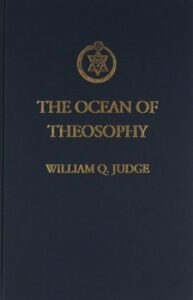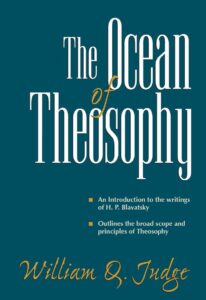Studies In The Ocean of Theosophy Part XVI
Theosophy Magazine
Vol. 22, No. 4 February 1934
pages 171 - 174
Part XVI
THROUGHOUT the “Ocean,” a finely balanced line of argument is sustained; but this present chapter, nine, might be designated as distinctly judicial. It bears the delicate touch of the true interpreter of the Law, who, seeing through the eyes of another, understanding his viewpoint, meets him on his own basis — thence leading him on to higher levels of discernment. Absurd ideas are assailed by no ridicule, and for selfish prejudice no reproach is forthcoming. Thus synchronized with the enquirer’s mind, Mr. Judge, with the sympathy of a Compassionater, yet with the adherence to facts characterizing the astute lawyer, proceeds to plead the case of Reincarnation versus the superstition of the race.
Step by step, objections commonly raised are analyzed and answered. The first taken up are those of the church, perhaps because the rarity of independent philosophizing on the part of church-goers entitles these exceptions to extraordinary consideration. Certain it is, that the Church’s denial of repeated lives on Earth “is enough for many.” Passively resting on this, “they do not wish to disturb the serenity of their faith” in dogmas that may be illogical, even if free from “blind fear of the anathema hurled at reincarnation in the Constantinople council.” Clerical anti-reincarnation arguments are all flimsy, but objection to the effect that “if men are convinced that they will lead many lives, the temptation to accept the present and do evil will be too strong” portrays contempt for the intelligence of the “flock.” And even were this assumption correct, wherein would morality obtain? Scarcely with the deceivers!
Amongst the mass of more independent thinkers, a variety of objections are raised: “the idea of rebirth is uncongenial and unpleasant”; “there appears to be no chance under it for us to see our loved ones who have passed away before us”; “Heredity invalidates Reincarnation;” it is “unjust because we suffer for the wrong done by some other person in another life.” Still others ask: “if we incarnate, how is it that we do not remember the deeds for which we suffer.” But strangest of all is the protest that the doctrine does not “account for the increase of the world’s population.”
Analysis proves those objections, one and all, to be but fabrics of delusion, sophistry, and selfishness; to which the answers of Theosophy stand deep-rooted in eternal Truth, unassailable and self-evident to reasoning minds.
The qualms of the church concerning the maintenance of morality are stilled by presentation of the scientific basis for ethics in the teaching of Karma, twin tenet of Reincarnation, which shows “a Nemesis for every evil doer.” Under this Law, “which is that of cause and effect and perfect justice,” each “must receive the exact consequences himself in every life for what good or bad deeds and thoughts he did and had in other lives.” So “the basis for moral conduct is secure.” But inasmuch as such self-responsibility, generally accepted, would relieve the church not only of anxiety, but of its authority, there is room for speculation as to whether or no this profound concern is exclusively due to a yearning for upright living.
Dislikers of Reincarnation are reminded that aversion to indigestion is no safeguard to the glutton; that “whether we like it or not Nature’s laws go forward unerringly.” Our daily activities would be greatly curtailed were there exemption from everything uncongenial — and many valuable lessons missed, as well.
To those fearing that under Reincarnation they might not see their “loved ones in heaven as promised in dogmatic religion,” it is pointed out how this promise “presupposes a complete stoppage of the evolution and development of those who leave earth before ourselves.” This counter-argument is replete with suggestions bearing more than a suspicion of the author’s quaint humor. For it indicates how, of necessity, the deceased infant must remain a heavenly baby forever, the aged stay eternally enfeebled, and the deformed and broken be bereft of any chance for improvement — lest all of these fail to be recognized. Again, since mortal existence is fleeting and paradise everlasting, it would be of paramount importance for believers of this dogma to die as soon as the prime of life is reached, to insure the permanency of this condition. Patently, desire for after-death recognition takes only the living into consideration; for, assuming “that recognition is dependent on physical appearance,” no thought is given by survivors, subject to constant change, as to how they themselves might appear to friends long gone, after intervening years of struggle here. The joy of recognition should be mutual!
But fear of not meeting the beloved hereafter “can have no existence in the face of the eternal and pure life of the soul”; for “those who are like unto each other and love each other will be reincarnated together whenever the conditions permit,” knowing each other by subtle recognition depending “on the inner sight and not on outward appearance.” Thus Reincarnation affords the only possible opportunity for true lovers’ meetings.
The idea that reincarnation brings suffering for wrongs done by another “is based on the false notion that the person in the other life was someone else. But in every life it is the same person,” or individuality. He, “like an actor who plays many parts,” is “the same actor inside though the costumes and the lines recited differ in each new play”; “for the great life of the soul is a drama, and each new life and rebirth another act in which we assume another part and put on a new dress,” but all through it we are the self-same spiritual person. Companion to this objection is that of injustice in suffering for unremembered deeds. In both these cases, the objectors “ignore the fact that they also have enjoyment and reward in life and are content to accept them without question.” However, instead of Reincarnation being unjust, “it is perfect justice, and in no other manner could justice be preserved.”
As to Heredity invalidating Reincarnation, Mr. Judge replies: “We urge it as proof.” Heredity is the channel by which the “Ego goes into the family which either completely answers to its whole nature, or which gives an opportunity for the working out of its evolution, and which is also connected with it by reason of past incarnations or causes mutually set up.” This accounts for the evil child in a “presently good family,” offering compensatory opportunity for “redemption of the child” and payment of debt by the parents. Heredity is “the mode selected by nature for providing the incarnating Ego with the proper tenement in which to carry on its work. Another mode would be impossible and subversive of order.”
“Again, those who dwell on the objection from heredity forget that they are accentuating similarities and overlooking divergencies.” Parents know their children to be “as different in character as the fingers on one hand”; and history “shows no constant transmission of learning, power, and capacity.” In fact “divergencies from heredity” are “vastly greater in number” and ultimately prevail over similarities, as evidenced by disappearance of family traits and the decline of races and nations. It serves the immediate needs of the Egos concerned. These transcended, other needs require their own peculiar conditions, as to family, nation, or race. Each man inherits from his own past. Reincarnation is the means for receiving this self-endowment.
The tendency towards divergency is due to cyclic law. Only the mental warp of straight-line evolution and the single-life viewpoint could accentuate similarities, beyond a very limited period. History and experience refute the idea. If persistence of similarity were the rule, we should still be enjoying the glories of ancient India; or to be strictly modern, we should still be driving ox-carts, as did our pioneer ancestors. Who wrought these radical changes, if not the Egos presently incarnated? Behind events and conditions, stand ideas. It is the ideas held or not held that cause the rise and fall of world conditions. Today’s commonest institution would astound our grandparents. The very speed with which great changes have been catapulted on the world demonstrates the inrush of entities impressed with these “modern” ideas — ancient, in fact. As the glory of a race fades with the glorifiers, so these same souls, when taking birth in other lands, bring their knowledge to shine forth in the new environment, both gift and inheritance.
“Memory of a prior life is not needed to prove that we passed through that existence.” “We forget the greater part of the occurrences of the years and days of this life, for no one would say for that reason we did not go through those years.” Yet, while this objection is invalid, the feeling that, if other lives have been, they should be remembered is itself a phase of this very memory. Some do so remember. “Poets have sung of this; children know it well” until our “atmosphere of unbelief drives the recollection from their minds.” Such ability depends upon the quality of the brain, the receiving and registering instrument. This “being new in each life” and so having “had no part in the life last lived,” “is in general unable to remember.” But by “living according to the dictates of the soul, the brain may at last be made porous to the soul’s recollections;” otherwise, “more and more will clouds obscure that reminiscence.” And “this is a wise law,” for only by such discipline could we become able to bear a knowledge of the past. As we are now, it is only merciful that “the deeds and scenes of our former lives” are “hidden from our view.”
Based “on imperfect tables which only have to do with western lands,” the objection regarding the supply of Egos for this earth is characteristically Occidental and bumptious. The “Masters of theosophical knowledge” alone could estimate such supply and demand. They assure that the supply of Egos is sufficient — even if this slant had “the slightest force or any relation to the truth of reincarnation.”
Back to The Ocean of Theosophy



